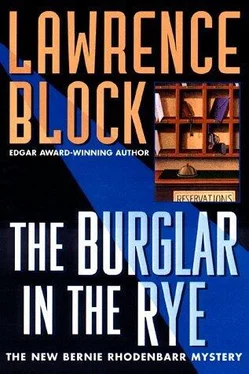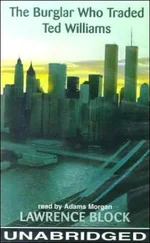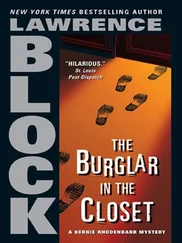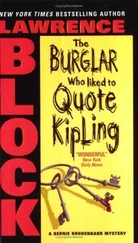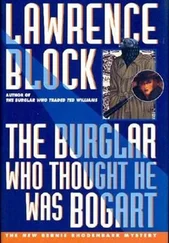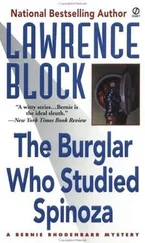He handed me the phone. Alice Cottrell said, “Bernie? Is that you?” I said it was. “Who was that just now?” A police officer, I said.
“Oh, then you can’t talk,” she said. “That’s all right. Look, I wanted to let you know that everything’s taken care of. I got what we were looking for.”
“How’d you manage that?”
“It’s too complicated to explain. But I called Gully in Oregon, and he couldn’t be happier. I ran the whole batch through a shredder and fed the shreds to the incinerator. I’m at the airport myself. They’re about to call my flight to Charlottesville.”
“Uh…”
“Bye, Bernie.”
The phone clicked in my ear. I held it out to Ray.
“Your turn,” I said.
“Nothing,” he said. “No Kassenmeier. Not at the Paddington.”
While he was on the phone, I’d brought in my bargain table and begun the process of closing up. I could have waited for him to give me a hand, but I’d still be waiting. Cops, I’ve learned, tend to avoid heavy lifting.
“Maybe she checked out,” I suggested.
“We know she checked out,” he said, “because you generally do when somebody sticks a knife in your heart. But she didn’t check out of the hotel because she never checked in in the first place. What makes you so sure she was there?”
“I was in her room.”
“Last night?”
“And once before.”
“But you never met her.”
“No.”
“An’ you didn’t know who she was.”
“No.”
“Then how’d you know it was her room?”
“Her suitcase was in the closet.”
“An’ all you gotta do is look at a suitcase an’ you can tell whose it is?”
“I can if there’s a tag on it with her name and address. But maybe she used another name when she registered.”
“And had her own name on her luggage tag?” He frowned. “She had ID in her purse in three different names. I tried ’em all on that fruit at the hotel just now.”
“Which fruit would that be?”
“The lounge lizard with the Shinola hair. Carl Pittsburgh.”
“Pillsbury.”
“Whatever. He never heard of her, no matter what name she used.”
“Then she used a fourth name. And she couldn’t have checked out of the hotel, because the room was still occupied around four in the morning. She may have been at my place by then, but she must have planned on returning to the Paddington. Her suitcase was still in the closet and her clothes were still in the dresser drawers.”
“Maybe I oughta go have a look,” he said. “You wouldn’t happen to remember the room number, would you?”
I picked up the phone and tried a number. No one answered, and I can’t say I was surprised.
“Sure, I remember the number,” I told Ray. “Want to trade?”
It was getting on for nine that night by the time I got over to the Bum Rap. I didn’t really expect to find anybody there-except, of course, for those people you always find there, and never find anywhere else. But Henry was there, his tan beret perched on his long egg-shaped head, his sensitive fingers stroking his silver beard. He had a drink in front of him, and wore an expression of perfect repose that suggested it wasn’t his first.
“Your friend was here,” he said. “Carolyn. A charming woman.”
“Was she drinking Campari?”
“Is that what it was? She called it Lavoris. She ordered one for herself and a double scotch for you.”
“And drank my scotch and left the Lavoris.”
“You mean she’s done that before? She had a second scotch, insisting that one was for you as well, and when the waitress brought it she told her to take back the Lavoris. ‘I’m not drinking anything tonight,’ she told her. ‘Not even the mouthwash.’ Then she bought me another drink and told me if I drank too much I should have something from the Uzbek restaurant. What do they have at the Uzbek restaurant?”
“Uzbek food,” I said.
“Well, she seems to think highly of it. She finished her second drink-well, your second drink-and threw some money on the table and marched out of here. She said she had to meet somebody and straighten her out. Here’s the waitress. What would you like to drink?”
“I suppose I should stick with scotch,” I said, “since that’s what I’ve had so far, even if I haven’t had any of it for myself. Is that what you’re drinking?”
“Actually,” he said, “this is rye.”
“Oh?”
“You got me to try it last night, and I ordered it today more or less automatically.”
“And you liked it just as well today?”
“It grows on you.”
“You think it might turn out to be your regular tipple?”
“It might at that.”
I ordered rye for both of us, and raised mine when it came. “To books that change a person’s life,” I said, “for better or for worse. Why a clay factory, Henry?”
“Come again?”
“How’d the business get started in the first place? Do they dig a lot of clay around Peru, Indiana?”
“They used to,” he said. “That’s how the business got started. Then, after it had been established for many years, the clay deposits were exhausted.”
“I know how they feel.”
“So we bought the raw clay down south,” he said, “and shipped it to Peru, where we did the processing and packaging.”
“And shipped it all over America.”
“All over the world. Wherever there are little children, and carpets for them to track it into.”
I worked on my drink. We both fell silent for a long moment, and someone put a quarter in the jukebox and played a Patsy Cline record. It wasn’t “Faded Love,” but it was still terrific. Neither of us said a word until Patsy was done.
Then I said, “Cole Porter was born in Peru, Indiana.”
“He was for a fact.”
“And there’s no clay there.”
“Not anymore. The deposits-”
“Are about as exhausted as they can get, because they were never there in the first place. There used to be considerable alluvial clay deposits quite a ways east of Peru, however, near a town called Huntington.”
He thought this over. “You know quite a bit about clay,” he said, “for someone who’s not in the business himself.”
“I went to a bookstore. Not my own, but the Barnes amp; Noble on Astor Place. I wanted to check the Mobil Travel Guide, and the only travel books I carry are the kind that warn you about the toothpick fish.”
“What does a toothpick fish do?”
“It embeds itself in the olive fish,” I said, “and the two of them float around inside a martini fish. Forget the toothpick fish, all right?”
“All right.”
“There’s a clay factory in Huntington,” I said, “and according to the Mobil Guide they offer free tours of it. Anybody who wants can just show up at the front door and they’ll give him a tour of the factory.”
“There could be a clay factory in Huntington, too,” he said. “Why not? It’s less than fifty miles from Peru to Huntington.”
“It looked farther than that on the map.”
“Well, it’s not. They’re both on the same river, the Wabash. Couldn’t there be clay deposits near both towns?”
“There could.”
“And couldn’t there just as easily be a clay factory in Peru as in Huntington?”
“I don’t see why there couldn’t,” I said, “but the fact is there isn’t. There’s Cole Porter’s birthplace, and there’s the circus museum, and there’s the locomotive monument commemorating the city’s railroad history. But there’s no clay factory.”
“Maybe not,” he said, “but there could be.”
“Have you been to Peru, Henry?”
Читать дальше
